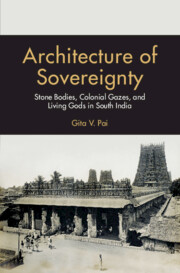Book contents
- Frontmatter
- Dedication
- Contents
- List of Figures
- Acknowledgments
- Notes on Transliteration and Spelling
- Introduction: Sovereignty’s Trace in Architectural Forms
- Part I Stone Bodies
- Part II Colonial Gazes
- Part III Living Gods
- Epilogue: Rejecting the State—Priestly Devotion and Protest in Modern Madurai
- Bibliography
- Index
1 - Constructing Kingship: Nāyaka Rule in Early Modern Madurai
Published online by Cambridge University Press: 19 April 2023
- Frontmatter
- Dedication
- Contents
- List of Figures
- Acknowledgments
- Notes on Transliteration and Spelling
- Introduction: Sovereignty’s Trace in Architectural Forms
- Part I Stone Bodies
- Part II Colonial Gazes
- Part III Living Gods
- Epilogue: Rejecting the State—Priestly Devotion and Protest in Modern Madurai
- Bibliography
- Index
Summary
Introduction
The Nāyaka warriors migrated to the Tamil region in the fourteenth century, where they ruled first as subordinate governors on behalf of the Vijayanagara empire, then as autonomous kingdoms after the empire's collapse. As their ties to Vijayanagara waned, the Nāyakas began to redefine kingship in early modern south India through literary and architectural traditions that challenged norms of sovereignty and the royal body. The consolidation of Nāyaka rule corresponded to a shift in discourses of kingship from narratives of valor, loyalty, and conquest to narratives of devotion and spirituality. This chapter presents a brief overview of Nāyaka history, drawing focus upon Nāyaka patronage of the Mīnākṣī-Sundareśvara temple and its Pudu Maṇḍapam, a major architectural project of Tirumala Nāyaka (r. 1623–1659 CE). Tamil chronicles, missionary reports, temple manuscripts, and epigraphical records illustrate how the Nāyaka rulers, and Tirumala Nāyaka in particular, became central to the history and identity of the Madurai temple. Tirumala's contributions to the temple were celebrated in prose poetry that lauded the king not as a soldier but as a great devotee: the corpulent statues that line the Pudu Maṇḍapam, in turn, reflect transformations in the aesthetics of sovereignty that accompanied transformations in political relations in south India.
Beginnings of Nāyaka rule in Madurai
The Nāyakas were warrior-peasants from Andhra territory who penetrated the Tamil country beginning in the fourteenth century. The word nāyaka referred to military officers in command of troops with prebendal rights over land. There are several speculated reasons for their southward migration: an opportunity to display their military prowess and expand their wealth; the promise of plentiful, thinly populated tracts of black soil for cultivation; or a desire to escape tax and conscription by the Bahmani and Golconda sultanates. Among the early Nāyaka settlers were Telugu soldiers who settled in the Tamil country during general Kumāra Kampaṇa's campaigns to extend the Vijayanagara empire in the late fourteenth century. Another early settlement was populated by the 1,400 bowmen, soldiers, and retainers who accompanied Eṭṭappa Nāyaka when he left his natal home of Candragiri in 1423 to settle in Madurai. During this period, merchants and artisans also journeyed from the north and settled in the arid and black-soil land peripheral to fertile areas.
- Type
- Chapter
- Information
- Architecture of SovereigntyStone Bodies, Colonial Gazes, and Living Gods in South India, pp. 21 - 52Publisher: Cambridge University PressPrint publication year: 2023

